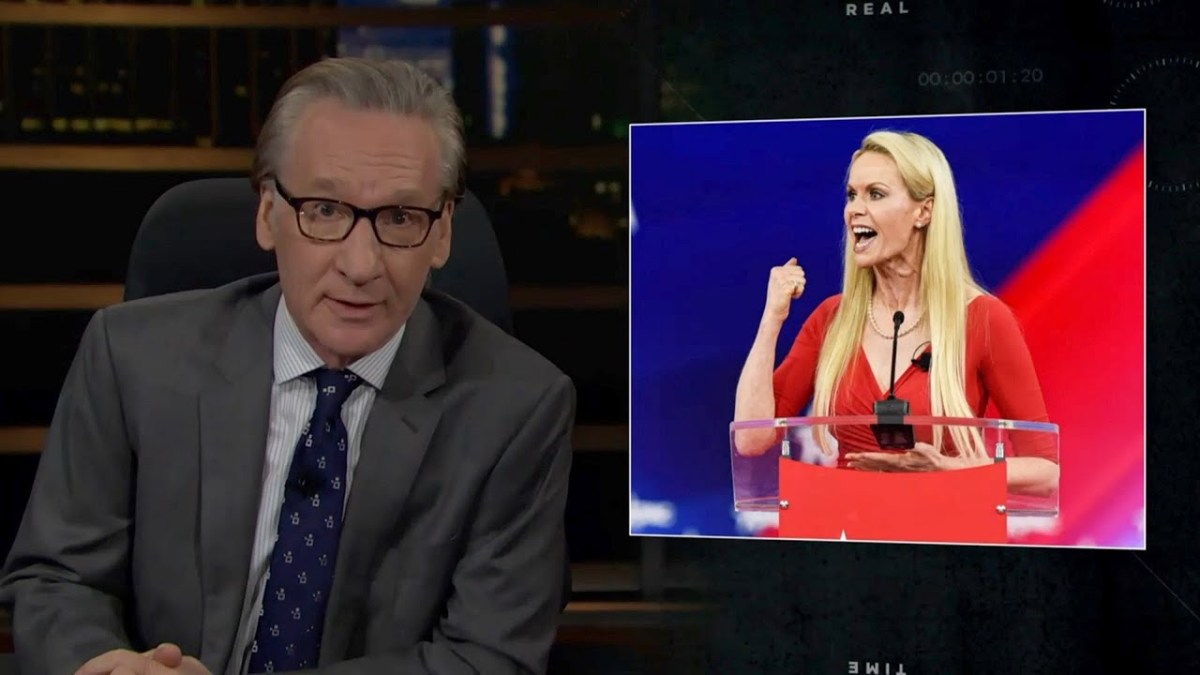Bill Maher has found the Oscars to be a reliable target for satirical barbs in recent years. So it’s not all that surprising that this week’s episode of Real Time began with a few digs at the expense of Will Smith. “The whole ‘keep my wife’s name out of your mouth’ thing didn’t really work out,” Maher said wryly. This, in turn, led to a series of jokes about Smith being potentially banned from attending the Oscars. “What’s the punishment?” Maher asked. And from there, Maher also made sport of how ubiquitous the story of Smith’s slap had become. “Other things are going on in the world,” he said, “but we don’t care about them.”
Nicole Perlroth, author of This Is How They Tell Me the World Ends: The Cyberweapons Arms Race, was the evening’s first guest, and spoke about cybersecurity. Maher asked if cyberwar was the coming war or the present war?
“We’ve basically been in a digital Cold War since the Cold War ended,” Perlroth said, and cited the example of nuclear power plants being hacked. Maher asked if Russia could turn the power off in the United States; Perlroth said, to Maher’s alarm, that Russia could.
Perlroth went from there to discussing the threat of hacked elections. She described a worst case scenario involving “digital disenfranchisement” and the confusion it would cause. She noted that banks have copious security; utilities and pipelines were, to her mind, more vulnerable. And she pointed out the obstacles to greater security: there are millions of dollars to be made by identifying zero-day exploits and selling them to governments.
She went on to cite a reluctance of people and institutions to admit to hacking, which creates a perception that this is less frequent than it actually is. Maher asked what governments should be doing to combat this. Perlroth noted that the private sector handles more vulnerable systems than the government. Lobbyists have pushed back against attempting to legislate some standards for security — something that she saw as having serious potential for problems in the future.
For the panel, Maher was joined by Laura Coates (author of Just Pursuit: A Black Prosecutor’s Fight for Fairness) and Andrew Yang (author of Forward: Notes on the Future of Our Democracy). The slap at the Oscars was the first subject up for discussion. “Liberal hypocrisy, I think, was the big loser,” Maher argued. His argument was, essentially, if you’re a celebrity making a case against microaggressions and improper contact, but you stood up to applaud Smith’s Best Actor win, you’re a hypocrite. For her part, Coates expressed surprise that Smith hadn’t been escorted out of the event after the slap.
This turned to a broader discussion of masculinity and how it’s perceived. Maher argued that Chris Rock displayed a more admirable aspect of masculinity by not hitting back and showing restraint. Maher asked Yang if he felt that men were in crisis, and Yang addressed his concerns over men bbecomingeing radicalized.
Maher went from there to what he described as a shifting perspective on lawyers in this country — from voters in Democratic primaries being skeptical of Kamala Harris and Amy Klobuchar for their work as prosecutors to Republican politicians criticizing Ketanji Brown Jackson’s work as a public defender. Coates drew on her own experience as a prosecutor, and pointed out that prosecutors and judges also have to be mindful of the rights of the accused. “I guess we’re all ‘soft on crime’ when we’re mindful of the Constitution,” she said.
Maher brought up the case of a Harvard professor who faced backlash for taking part in Harvey Weinstein’s defense team. Yang made the argument that people are, indeed, entitled to their lawyers. And Coates brought everything full circle. “Harvey Weinstein also kept his Oscar,” she said. “Keep that in mind when they decide about Will Smith.”
The legal debates continued on Overtime, when both Coates and Yang weighed in on whether Attorney General Merrick Garland was doing enough to address those who’d been involved in the events of January 6. Overall, this was one of the more memorable panels from this season. Maher had a good rapport with both guests, both of whom spoke knowledgeably on a variety of subjects.
New Rule began with Maher riffing on corporate figures — including the idea of the Maytag repairman as the Terminator, alongside riffs on the dog in the Cadbury egg commercials. Maher segued to the meat of things by criticizing Fox News’ tendency to cherry-pick something he said critical of the left while ignoring his criticisms of Republicans — and then proceeded to make a withering critique of what he dubbed “foaming-at-the-mouth Kraken-releasers.”
Maher hearkened back to several Republican candidates who ran in 2010 and whose policies seemed, at the time, beyond the pale. Now, he noted, those policies had become the party line. “Remember the first rule of modern Republican politics: they always go lower,” Maher said. Then he went on to cite a recent Republican gubernatorial hopeful in Nevada, who spoke about murdering Syrian refugees. This was, as Maher noted, a long way from George W. Bush’s “compassionate conservatism.” And so the episode ended, with the midterm elections seven months away.
Thanks for reading InsideHook. Sign up for our daily newsletter and be in the know.


















